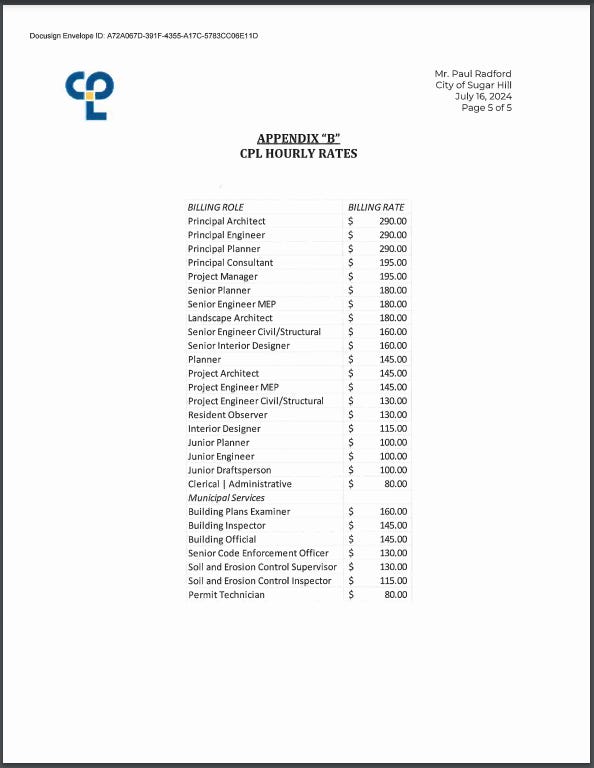City of Sugar Hill Hires Interim Planning Director
At the City of Sugar Hill Planning Commission (SHPC) meeting on August 19, SHPC Chair Phil Olsen introduced meeting attendees to Rebecca Keefer of firm Clark Patterson Lee (CPL), the City’s new Interim Planning Director. Former Planning Director Kaipo Awana informed the public at the City Council Meeting on July 8 that he would be leaving his position with the City of Sugar Hil to take a position as the City Administrator for the City of Grayson. He stayed with the City through the end of July.
The night of the meeting, Real Deal Sugar Hill verbally mentioned the new staff member to Council Members Gary Pirkle and Meg Avery, both of whom indicated at the time that they were not made aware of the City’s decision to bring Keefer aboard.
The City Council (now comprised of three new Council Members who ran on a platform advocating lower density) did not publicly discuss or vote on any plan or contract to hire the Interim Planning Director. In fact, Keefer wasn’t even introduced at a City Council meeting until City Manager Paul Radford introduced her at the September City Council Work Session on September 3.
An Open Records Request (ORR) for “contracts for retaining the services of Interim Planning Director“ revealed a contract City Manager Paul Radford signed on July 17 for the services to be provided by Keefer and a support team from CPL.
The contract includes an hourly rate schedule for the services of those employees, and indicates that Keefer’s rate is $195 an hour. CPL will also be billing the City of Sugar Hill for “direct” expenses incurred, plus 15%. They say these expenses “include, but are not limited to, reproduction cost, courier service, mileage, telephone/fax cost, etc.” CPL will be submitting monthly statements to the City for “services rendered and reimbursable expenses.”
CPL explicitly states in the contract, “We estimate that the total cost for this engagement will not exceed $30,000 for an estimated three-month period.” CPL also states, “We will not exceed the estimated budget without authorization from the City.”
Real Deal Sugar Hill plans to request copies of those statements as the contract period progresses so the public can monitor whether that ends up being the case.
Keefer is supposed to be onsite eight to twelve hours per week, “or as needed,” according to the contract. Most of her responsibilities seem to be the same thing Awana was probably doing prior to his departure, such as overseeing the Planning Department and managing all their processes, meeting with developers and permit applicants, coordinating with the City Manager and Assistant City Manager, and attending City Council meetings.
However, the contract indicates that the City has also requested that Keefer and her team:
“identify potential changes needed in the City's zoning and development codes.”
“coordinate with the outgoing director and understand the challenges with the current zoning and development ordinances.”
“plan and execute recommended amendments to the ordinances.”
The contract continues, “If desired, a separate task order can be developed by our team to carry out the amendment process.“
The City has not been openly discussing plans to make changes to the City of Sugar Hill Zoning Ordinance. However, it seems pretty clear that Radford intends to pursue that, judging from both the contract and the background of the person assigned to fulfill it.
According to the CPL website, it appears that zoning ordinance development and overhauls are Keefer’s primary professional focus and the company sells her services thusly. CPL’s main biography of Keefer says, “she facilitates the growth and revitalization of towns, cities, and counties by pinpointing residents’ needs and developing long-term roadmaps to meet them.”
CPL introduces a blog post she wrote for their website, saying “When it comes to understanding the full impact that zoning ordinances have on a community’s long-term planning efforts, CPL Planner, Rebecca Keefer, AICP, is an excellent go-to resource. With more than a decade of experience in community planning, design development, visioning, master planning and public engagement, Keefer is well equipped to develop effective ordinances for any community’s planning documents.”
Keefer’s blog post, entitled, “Developing an Effective Zoning Ordinance,” begins,
“Zoning ordinances play a significant role when implementing a community’s long-term planning efforts. As a critical follow-up to a set of planning documents, these rules help define how properties within specific zones can be developed. In doing so, they become very effective in directing private investments, helping communities achieve their desires and visions for growth.
The only thing worse than a set of ordinances that do not move a community toward its vision are ordinances that are contrary to it. Whether communities are in need of a full ordinance rewrite or more simple incremental changes, there are critical steps you should take to develop an effective zoning ordinance.”
As she details the process of developing a zoning ordinance in the blog post, she says at one point, “Allow all stakeholders to provide meaningful feedback on the projected impacts—that’s residents, developers, builders, community groups, etc. They all play an important role in this process.”
The residents of Sugar Hill are increasingly voicing frustration with density while developers, builders, and community groups with connections to the City (and the aforementioned developers and builders) are requesting and promoting increasing density.
How (or if) the City plans to reconcile the divergent concerns of those groups remains to be seen.








